- Home
- Hammond Innes
Dead and Alive Page 2
Dead and Alive Read online
Page 2
The cove, as I say, was narrow. It was not more than a hundred yards across at the entrance and it narrowed all the way until the confining cliffs swept round, green with water-moss, to meet where the valley stream flowed down a dark crevice. These landing-craft tank are about 180 feet long by 36 feet wide. What had saved it, of course, was the fact that it had been empty when it drove in. The flat bottom would draw little more than 5 feet at the stern and with her double bottom and her air tank sides she would ride the back of a breaking comber like a cork. Nevertheless it was a staggering sight to see her there, propped upon the rocks like a bait to challenge the fury of the sea. Every wave that surged into the cove seemed to gather itself together before it broke, as though to say, “I’ll get it this time.” But though these were spring tides and it was just about at the high, only the driven spume splattered the rusty plates with water.
The sun came out as I went down the steep path and the cove was suddenly full of colour. The earth was fresh after the night mist. The sea drowned the sound of my footsteps. I was in a world of my own—a world that belonged to Jenny and me. And yet I was not sad any more.
Perhaps I sensed the hand of Fate that had brought me back to Trevedra and down to this stranded hulk on the rocks of Bossiney Cove. I like to think so. But I don’t know. Certainly I did not know then as I walked down that rocky cliff path that my feet were leading me half across the world, back to the Mediterranean, to strange happenings, to danger and a life of adventure. All I knew was that in that moment there was no longer an ache at my breast. I knew nothing of Monique then, of her elfin beauty, her tragic story and the dark rackets of Naples and the bleak life on the hills beyond Tivoli. But I felt an exaltation as I went down into the cove that I had not felt since I returned to England—an interest in life that cut across the jagged edges of my memories.
It was strange. Jenny and I might have chosen any one of a thousand and more farms in which to spend that two weeks of holiday before the war. But only one of those thousand and more farmsteads was in the next valley to the stranded wreck of an L.C.T. when the war was over. And we had chosen Trevedra—and Trevedra was that one. Of such strange things is the thread of destiny woven.
I reached the beach. It was seemingly deserted. The landing craft towered above me, big in the confines of the cove. Its rusty sides broke the force of the wind and shut me off from the noise of the sea. The thick steel door was half down, held by one rusty chain—the other had snapped and the broken end hung dejectedly against the side of the ship. I climbed over the rocks and peered beneath the hull. Sand, piled up by the winter storms, had been dug away. Except for one jagged rent near the stern, the hull seemed intact. It was one of the strangest things I had ever seen. She hadn’t broken her back and she was only holed in one place. She was resting fairly on flat sloping outcrops of rock.
I clambered round to the stern. The rudders were both badly buckled, but the propellers were unharmed. There was no anchor and the girders that supported the bridge and deck housings were badly buckled. The pompoms had gone—presumably the naval authorities had unshipped them—and the mast was snapped off short. The funnel was dented and on the seaward side the bridge was badly shattered and looked like a twisted heap of old scrap iron.
“Hullo, there!” The call was faint, whipped away in the wind and the roar of the sea.
I looked up. A man was seated on one of the for’ard bollards smoking a pipe.
“Hullo,” I said. “Do you allow visitors?”
He rose from his seat and came aft. He looked a wild figure, bearded and with his long dark hair on end with the wind. He wore a dirty polo sweater that had once been green, and brown corduroy slacks.
He found a rope ladder and tossed it over the side. When I climbed over the broken rail, I found him leaning against the side of the wheel-house. He was tapping his teeth with his empty pipe and his grey eyes, narrowed, searched my face.
“My name is David Cunningham,” I said. “I just came over——” I stopped there for he did not seem to be listening. He made no move to take my hand, but stood, staring into my face.
“My luck is in,” he said suddenly. “I don’t know why you came—we’ll go into that later. It’s like the answer to a prayer.” He took his pipe out of his mouth and stabbed at me with the bitten stem. “The last time I saw you,” he said, “was on the beaches at Salerno.”.
“On the beaches at Salerno?” I echoed in surprise.
He nodded. “I watched you come down from the cliff top. Something about you seemed familiar. And when you looked up at my hail—then I knew who you were.” He started filling his pipe from a coloured silk pouch. “On the beaches at Salerno—you had a battered old battle bowler cocked over one eye and you steered an L.C.T. loaded with tanks straight in to my beach. I was never more glad to see a bloke in my life.”
“I remember you now,” I said.
The cliffs that hung above us blurred and the thunder of the sea merged into the crash of artillery. In my mind’s eye I saw a sandy stretch of beach backed by low cliffs. The shattered hulk of an L.C.T. lay on its side, half submerged in the surf. An A.L.C. full of shrapnel holes and dead bodies was beached beside the wreckage of two ducks that had gone up on mines. And peering out of the water was the cab of a drowned Bedford truck and the turret of a light tank. The beach was littered with figures, some sprawled taut in the fixity of death, others belly-flat to the scooped-out sand in the desperate hope of life. Bullets chipped at the sea or riccochetted, whining, off our plates. And overhead was the constant muffled crump of airbursts from 88’s high up in the hills.
And in the midst of all that hell a young captain stood knee-deep in the water, waving me in to the one sound berth. I had gone in at emergency full ahead, with the tank engines drowning the sound of the shell bursts. I had dropped the doors as I grounded and he had jumped the first tank as it rolled off into three feet of water.
He gave me a cheery wave and the last I saw of him was riding up the beach to the shelter of the cliffs and signalling the others to follow him and his men to join in behind the shelter of the tanks.
I had hauled off and pulled up my doors by then. And I left that shell-torn beach just as fast as I could, thinking that he was a very brave man who had little chance of life.
And now here he was, shaking me by the hand and saying, “My name is Stuart McCrae.” The beard made a difference and without a tin hat his dark hair showed streaks of grey. He was older than I had thought.
He glanced at his watch. “It’s a bit early for ‘Up Spirits’ by naval reckoning, but I’ve some Scotch, and the weather and the occasion both call for it.”
He led the way into the wheel-house. It was comfortably furnished with a round plain oak table of modern design, three chairs, an easy chair, a small desk table on which was a typewriter, a shelf of books and a big cupboard. Two oils and the photograph of a wide-eyed, fair-haired girl with a baby in her arms hung on the steel walls.
As he came back from the galley with glasses and a jug of water he caught me staring at the table which was charred. The chair legs also had burns. “Salvage from my London flat,” he explained.
We drank in silence. I was thinking of those years abroad and how we’d longed for our homes. And now here I was alone in a room in a farmhouse and he was living a hermit’s life in the wheelhouse of a derelict L.C.T. I didn’t dare ask where the girl with the child in the photograph was. I could only suspect.
“You on holiday?” he asked suddenly.
“Not exactly,” I told him. “I’ve just been demobilised and I’m trying to adjust myself.”
He nodded. “To adjust oneself—that is the most difficult thing in the world to do when——” He laughed and it was not a pleasant laugh. “My life here is finished.” He gave a shrug to his shoulders. “England is dead to me. I’ve seen too much and done too much, and the roots I had are no longer there.” He raised his glass to me. “Here’s to the New Britain! May no one else find it as dull as
I do.”
“Why do you say that?” I asked. “Here, in this country, the world is in the making. We’re at the height of our power—the oldest, the most mature and the most stable of all nations of the world. We have a democracy that works and a people with a sense of responsibility to the world. And the world looks to us.”
“To us?” His brows lifted humorously. “Maybe it looks to Whitehall, to the men who have dug themselves in behind their mahogany desks and will fight to the last white man overseas—not us.”
“You’re bitter,” I told him.
“No, not bitter.” He said it thoughtfully as he refilled our glasses. “It’s just that I understand things more clearly than I did. I can understand the Twenties now—the period between the wars. They lost hope of a new world when they came back from the trenches and found all the back row boys well entrenched behind red tape entanglements. They felt there was nothing that they could do but try to forget.”
I didn’t make a reply. There was a lot in what he said.
“In the words of the prophet—we’ve had it,” he said. “The generations that fought won’t rule this country for another twenty years. But—” and his eyes, grey flecked with green, looked straight into mine—“this country’s future isn’t going to be built here at home. We must go out and wrest our titles to greatness from the world as the Elizabethans did. I saw enough in the Middle East and Southern Europe to realise that the great trading days are by no means over. Now you were a landing craft skipper in the Navy. Did you ever think of the possibilities of L.C.T.s on the trade routes on enclosed seas like the Mediterranean?”
He drained the remainder of his whisky at a gulp. “I came down here to adjust myself, the same as you. I started at Bude and set out with a rucksack to walk to Land’s End. This is as far as I got. I heard about this old tub in a bar at Boscastle. And when I saw it, it was the end of my walking.
“She was full of water and sand—in a filthy state. And the locals, with true Cornish thoroughness for wrecking, had taken every movable fitting. There’s no compass, no ropes, no bunks, the wheel has gone and even the galley stove has been filched. But—and this is what the Navy people didn’t know—the skipper of this boat did a bloody good job with the engines. When I recce-ed the ship I found the engine-room full of sand and water. But under it all were great gobs of grease. The engines were thick with it. Now I’ve cleared the engine-room out and the old Paxmans look like new. I had them going a week ago and they ran perfectly. I’ve dug her out underneath with the help of a half-witted local boy and she’s O.K.”
“Just a moment,” I said. “Does this craft belong to you or are you just doing all this for the fun of it?”
“No, she belongs to me. I bought her for a song off the Admiralty—they were selling her as scrap and part of the agreement is that I undertake to clear her from the beach. There’s nothing in the bill of sale to say that I can’t remove her intact and afloat—and that’s just what I intend to do. And there’s nothing to say I’ve got to break her up and sell her for scrap—which needless to say I don’t intend to do.
“Now then,” he said, “would you like to come in on this. I need somebody who understands these boats. I’ve done a good bit of bridging and suchlike commonsense engineering jobs. But I need somebody who knows more than I do to get her off these rocks without damaging her. And when she’s off, I need somebody to watch the refitting and to sail her. Have you got any money put by?”
“A little,” I said. His enthusiasm was infective.
“Right—now here’s a proposition. Apart from what I paid for her I’ve got about £1,500. That in my opinion is not enough capital to start out on. Your help can get her off. Then when she’s afloat put up what you can and we’ll form a private company with the ship as its assets, and we’ll split profits on say a 70-30 or 60-40 basis according to how much you put up. We can’t lose on it. Afloat she’ll be worth quite a bit in a foreign country.”
I helped myself to another Scotch whilst I thought it out. The question was, could she be got off and floated without tearing the hull to shreds? And how much would it cost to float her—a lot of tackle would be required.
“Let’s go out and have a look at her,” I suggested.
I was quite excited. It was a proposition that had definite possibilities.
The tide had ebbed back from the rocks and we could stand on the sand and get a comprehensive view of the position of the ship.
“I’ve thought of rigging hawsers to the rocks at each side of the entrance to the cove and winching,” he said. “But there’s that jagged rock by the stern—it’s the one that did the only spot of damage to her hull, and she’s going to slide off her lodgment right on to it. I thought of trying to lift her off with hawsers slung to the cliff on either side, but they’d never stand the strain.”
“You’d never do it that way,” I told him. “You need a ramp and rollers if you’re going to have any chance of getting her off without damage.”
“And that would cost a packet.”
“Yes,” I said, “if you had to build the ramps. It would be a big concreting job and it would cost a lot.” My mind was suddenly made up. “How much were you reckoning to spend on floating her off?”
He shrugged his shoulders, his hands deep in his corduroys. “I reckoned it might cost all I had. So far, all I’ve put into her, except for the initial purchase, is my time and the cost of this boy whose been working with me. But I’m prepared to take a chance on all I have. It’s a gamble, but I’ve thought it out and I figure it’s worth it. That’s why, apart from your knowledge and experience, I need somebody with a little extra to put into the refitting.”
“All right,” I said. “Now supposing I said I think I can get her off without damage—would you be willing to form a private company on a fifty-fifty share basis, a proviso being that I undertake to float her and pay the cost of doing so. That’s my experience and naval contacts to offset your original idea and expense in purchasing it.”
He looked at me for a moment. Then he said, “Okay. We’ll call that a deal. And that calls for another whisky—we may as well finish the bottle.”
Well, it was settled there and then and we drew up a preliminary agreement embodying the undertakings on either side. And next day I took the train to Plymouth.
I hadn’t told him that all I possessed in the world did not amount to more than just over £500. I hadn’t told him how I was going to get the craft off. I didn’t know. I had bluffed him into thinking that I could do it. But could I? Supposing the Dockyards hadn’t got any L.S.T. landing pontoons? I needed hawsers and a winch, too. Suppose they wouldn’t let me borrow them? And if I got them how was I to rig them?
There were so many problems to solve and I thought of nothing else as the train rolled its way across the Cornish moors and into Devon.
However, my luck was in. I discovered that a man I knew was connected with Admiralty stores. I entertained him to dinner that night. He was a lieutenant-commander now. When I’d known him in the Anzio days Slater had been one of the few regular skippers in the Combined Operations outfit. I told him the whole story.
But when I explained how I intended doing it, he shook his head. “Niente pontoons, chum,” he said. “They’re all out in the Pacific still. Doubt whether you’d find any at Portsmouth even. What about derricks? I’ve got some of those and masses of steel hawsers and winches I can lend you.”
“That’s going to be a hell of a job,” I said. “She’d most likely break her back on the rocks. Now with a pair of those pontoons and log rollers I reckoned I could have her off in no time.”
“Yes, chum, but I haven’t got any,” he said. “If I’d got ’em I’d let you have them—but I haven’t and that’s all there is to it.”
I felt depressed. Now that I was in danger of being unable to do what I had so glibly promised to do, it had suddenly become violently important. I arranged to come down the following morning to have a look round the yards for wha
t I wanted and we got quietly drunk on rum and old memories of the Wavell and Montgomery campaigns.
The following morning I went all over the yards with him. Equipment of every kind was there. But no L.S.T. pontoons. I eventually decided on two small but powerfully built hand winches, two big steel jacks, six really strong steel girders twenty feet high, pulleys, chains, and great coils of wire hawser with blocks and tackles.
Slater had all the gear loaded on to an old barge. “There’s an Admiralty tug going up to Cardiff tomorrow,” he said. “We’ll get her to tow it up. She should be off Boscastle about 10.00 hrs. the following morning. Get one of the motor fishing boats out and take the barge in to Boscastle. And remember—I want the barge and the gear back. I like helping my pals, but not to the extent of a court-martial.”
“You’ll get it back within the month,” I promised him. “And the old L.C.T. will be towing it.”
“Like to bet on it?” he said with a grin.
“No,” I told him. “But I’ll buy you the biggest dinner you’ve ever had in your life if I get her off.”
“That’s a date,” he said, shaking my hand. “Lots of frutti di mare, eh? Plenty lobster and Bifstek—doppio. Well, chum, I hope you do it—but I think you’ve taken on rather a big thing.”
That was my view, but I didn’t tell him so. I spent a sleepless night trying to visualise, step by step, the equipment I’d borrowed doing the job it had to do. The next morning I returned to Tintagel. I had a late lunch at the farm and then walked to Boscastle to arrange about the boat. By the time I got back it was late to go stumbling in the dark down to Bossiney, and I decided that at least I might as well have the pleasure of surprising Stuart with my borrowed tackle.

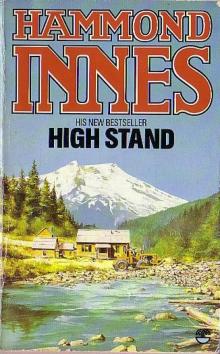 High Stand
High Stand The Doomed Oasis
The Doomed Oasis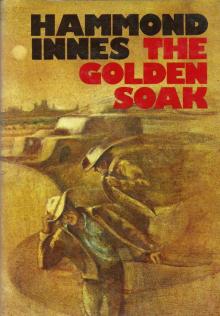 Golden Soak
Golden Soak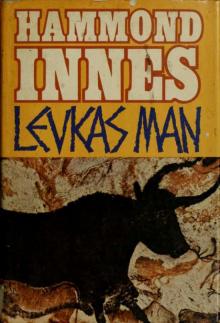 Levkas Man (Mystery)
Levkas Man (Mystery) The Strange Land
The Strange Land Dead and Alive
Dead and Alive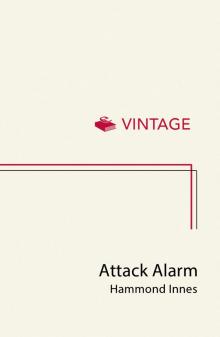 Attack Alarm
Attack Alarm The Strode Venturer
The Strode Venturer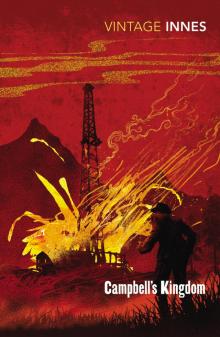 Campbell's Kingdom
Campbell's Kingdom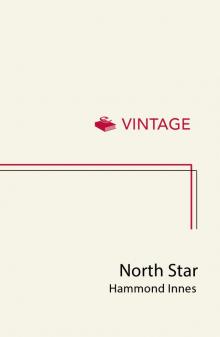 North Star
North Star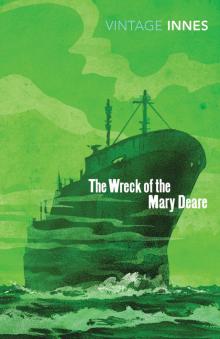 The Wreck of the Mary Deare
The Wreck of the Mary Deare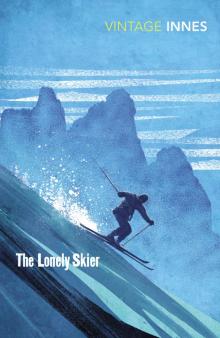 The Lonely Skier
The Lonely Skier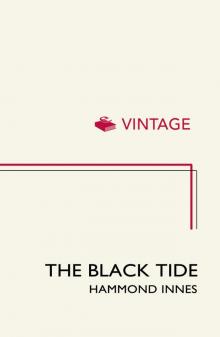 The Black Tide
The Black Tide The Trojan Horse
The Trojan Horse Medusa
Medusa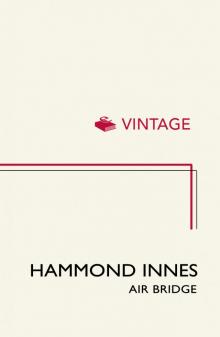 Air Bridge
Air Bridge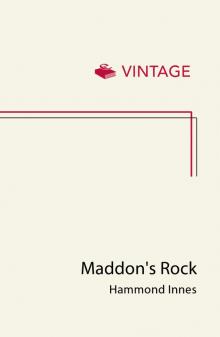 Maddon's Rock
Maddon's Rock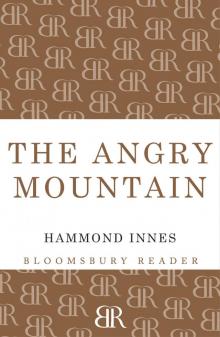 The Angry Mountain
The Angry Mountain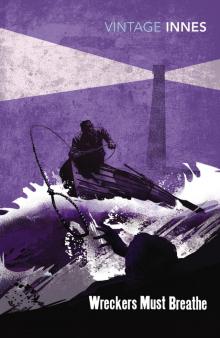 Wreckers Must Breathe
Wreckers Must Breathe Solomons Seal
Solomons Seal The White South
The White South